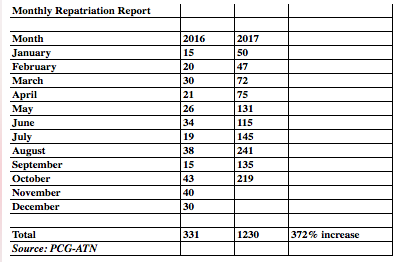‘Vegetables and bread are mostly the staples here. Eh, sanay tayo ng rice, para sa atin miryenda lang yung gulay at tinapay. (We are used to rice. For us, vegetables and bread are snacks.)
DUBAI: One of the Philippine Consulate General’s major concerns are runaway OFWs, mostly women from the provinces in the Philippines lacking formal education and lured by human traffickers to take their chances in the UAE.
Their number has tripled so far this year compared to the whole of last year’s, according to records at the Philippine Consulate General’s Assistance to Nationals (ATN) section – or from 331 for the whole of 2016 to 1,230 as of Sept. 2017.
“That figure will be more than 1,700 by year end,” said Consul General Paul Raymund Cortes in an exclusive interview with The Filipino Times.
Indeed the numbers are alarming: 15 in January 2016; 50 in January this year. Thirty-eight in August 2016; 241 in the same month this year. The ATN report also showed that numbers spiked during Ramadan when working hours adjust to suhoor and iftar. (See table for the complete details)
“Hindi kasi sila nakapag-Pidos dahil lumabas sila ng Pilipinas on visit visa. (They weren’t able to attend Pidos because they left Philippines on a visit visa),” said Vice Consul Marianne Bringas, ATN head, referring to the mandatory Pre-Departure Orientation Seminar (PDOS) that OFWs take at the Philippine Overseas Employment Administration (POEA).
“Yung iba, hindi marunong mag-operate ng dishwasher o laundry machine and others don’t even know the language. (Others don’t know how to operate dishwashers or laundry machine and has no conversational knowledge of the language),” Bringas, who’ll be on her first year of consulate duty on Nov. 23, added.
She said most of the runaways entered Dubai on visit visas only this year, indicating a surge on human trafficking activities.
Among allegations the distressed OFWs state for running away was that they were being made to work almost 24/7. “Other employers allegedly keep their mobile phones, only giving them a day and time to use it,” said Bringas.
There have also been allegations that the OFWs were not properly being given food. “Here, vegetables and bread are mostly the staples. Eh, sanay tayo ng rice, para sa atin miryenda lang yung gulay at tinapay. (But we’re used to having rice, for us vegetables and bread are snacks),” said Bringas.
Meal time is also an issue whereby lunch is around 2pm whereas back home it’s between 11am and noon. (Jojo Dass)







